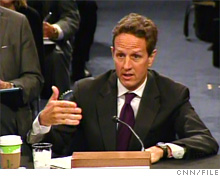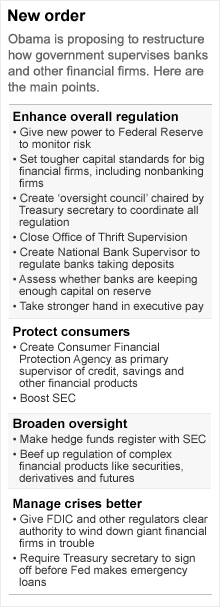Geithner defends reform plan before Congress
Lawmakers questioned the Treasury Secretary about greater powers for the Federal Reserve and other financial regulatory proposals.
 |
| Treasury Secretary Timothy Geithner on Thursday defended the White House's regulatory reform proposal which would grant the Federal Reserve greater powers. |

NEW YORK (CNNMoney.com) -- Treasury Secretary Timothy Geithner testified before lawmakers Thursday, defending a sweeping set of proposals put forth just a day earlier by President Obama aimed at overhauling the nation's financial system.
At the first of his two scheduled appearances before Congress, Geithner fielded pointed questions from Senate Banking Committee members on the design and objectives of the plan, including consolidation of the nation's banking regulators and the creation of a new agency dedicated towards protecting consumers from financial products.
Geithner was also due to testify before the House Financial Services Committee Thursday afternoon, but the hearing was postponed due to floor votes. The committee said the hearing would be rescheduled for a later date.
In his appearance before members of the Senate, the Treasury chief spent much of his time defending the Obama administration's plans to broaden the Federal Reserve's regulatory reach.
"Why is it your judgment that the Fed should be given this additional extraordinary authority and power?" asked Sen. Banking Committee chairman Christopher Dodd, D-Conn.
"Does it not conflict in many ways, or could it not conflict, with their fundamental responsibility of conducting monetary policy?" Dodd continued.
Under its proposal, the White House wants to extend the central bank oversight over large financial firms and formalize the Fed's role as the lender of "last resort", in addition to its existing powers to set monetary policy.
Many critics have charged that the Federal Reserve contributed to the nation's housing bubble by keeping interest rates extremely low for a lengthy period of time earlier this decade.
There have also been allegations that the central bank was asleep at the wheel when it came to protecting Americans from the dangerous mortgages and usurious credit card agreements that have made the current recession particularly painful for consumers.
"What makes you think the Fed will do better this time around?" asked Sen. Jim Bunning, R-KY, a perennial Fed critic.
Geithner conceded that changes to the current system would not enable the Fed to protect the markets against every threat, but he maintained that empowering the Fed made the most sense given the circumstances.
A new agency or committee created to shoulder some of the Fed's new responsibilities might be ill-equipped to react appropriately in the event of another crisis, he noted.
Geithner said the White House tried to learn from the experience of other countries during previous financial crises. Efforts by those governments to remove power from their respective central banks, he noted, did not work in the past.
The White House does seek to strip the Fed of some of its powers though under its plan. It hopes to hand its oversight of mortgages, credit cards and other financial products to a new watchdog agency for consumer financial products.
Geithner also provided lawmakers with some greater clarity about some of the less-detailed components of the Obama plan.
The proposed council of regulators, for example, would serve to gather information and make recommendations about any potential systemic risks. But it would not have the power to compel or force changes - a move that was done intentionally to prevent regulators from passing the buck in the event of another crisis.
"Those kinds of changes could lead to more diffusion of accountability," said Geithner, who, as Treasury Secretary, would chair the council.
Geithner acknowledged that there were still other challenges the White House plan did not address, namely the fate of mortgage giants Fannie Mae (FNM, Fortune 500) and Freddie Mac (FRE, Fortune 500), both of which were seized by the government last fall.
Geithner said the two government-sponsored enterprises were a core part of what went wrong with the housing market, but said that the subject of how the government would exit its ownership position in Fannie and Freddie was a debate for another time.
Underlying the entire hearing, however, was a desire on behalf of both lawmakers and Geithner to act swiftly, and more importantly, get regulatory reform right.
"Reforming our financial regulatory system may be the most significant thing many of us will do while serving in the United States Senate," said Sen. Richard Shelby of Alabama, who serves as the ranking Republican member of the committee.
"I hope that we do not collectively refuse to embrace this unique opportunity because failure is not an option," Shelby added. ![]()

